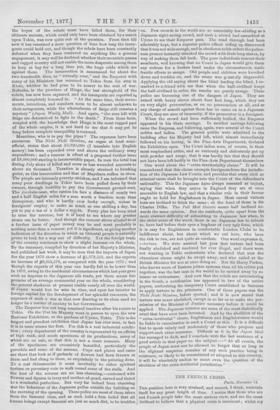THE FRENCH CRISIS.
Paris, November 14. THE position here is very strained, and cannot, I think, maintain itself for any great length of time. I notice that those who are not French people take the most serious view, and are the most inclined to believe that a physical crisis is imminent ; whilst my French friends believe that the danger is in the future rather than in the immediate present,—that it consists in the presence face to face of the two hostile parties, in the daily sore, in the war of words, in the growing distrust, and in the complications that must continually arise. For the moment, they have full con- fidence in their own patience and relf-restraint, and are deter- mined to afford no pretext for the Marshal to appear at the head of his legions. French friends believe that the danger is in the future rather than in the immediate present,—that it consists in the presence face to face of the two hostile parties, in the daily sore, in the war of words, in the growing distrust, and in the complications that must continually arise. For the moment, they have full con- fidence in their own patience and relf-restraint, and are deter- mined to afford no pretext for the Marshal to appear at the head of his legions.
Unfortunately there are some circumstances in the case which do not favour a peaceful solution. Public opinion, as apart from party opinion, condemns the conduct of the Marshal and his Ministers. I have heard the more thoughtful Conservatives speak in flagrant scorn of the conduct of those in power ; that wind-blown and rather impotent class of politicians, the Paris shopkeepers, are decidedly opposed to the official conspiracy, and some of the papers of the defence only apologise for the Government by continual attacks upon the inherent wickedness and the ulterior designs of its opponents. But this public opinion seems to have no power of settling the question. It is no solvent, as it would be with us in England ; it leaves the active forces that are opposed to each other neither increased nor diminished ; it exists, but it does not govern. My friends shake their head, and say that public opinion has no power over the men with whom they have to deal. I fear it is true, but they do not know, as they say it, what a sentence against all France is recorded in their words.
Another unfavourable feature is the disease of terror that afflicts a large part of society. To these people, the Marshal and his army are the thin plank that divides them from the infernal regions. I have some very reactionary friends in Paris, who reflect the mental condition of a large number of others besides themselves, all of whom succeed in frightening themselves very seriously. They tell me terrible stories of what their frotttur reports to them as regards the sayings of the class to which he belongs. I am less impressed than I might be by the frotteur, because I remember that he was reporting in the same manner when I last visited Paris, two years ago, and I am learning to look upon him as an institu- tion. It is in vain to tell my friends that it is the Marshal and his Government who are the authors of their danger, and of the terror they feel. Whatever may be the temper of the Paris working-people, there is but one course left for society to follow, and that is to accept law in order that the workmen may accept it, to renounce the methods of force in order that the workmen may renounce them. The Marshal is the one dangerous man in France at this moment, as the official who continually called for silence was, according to the dictum of the Judge, the one noisy man in court.
It would be unfair, however, to suppose that this panic exists entirely without foundation. No doubt a great deal of oppo- sition to the majority of the Deputies arises from the conserva- tive distaste for certain liberal measures which are looked upon as the consequence of a really Left Ministry. But it is not the fear of secular education, or the suppression of what we should call denominational grants, that throws the dead weight of so large a part of society on the side of personal rule. The violence of the past leaves its consequences behind, and in France each man dreads the other, when he sees the latter coming into power. It will be a happy day for France when the Republican party (there is no hope for it as regards the other party) deliberately set themselves to convince the whole people that their rule is broad enough and even enough for all to live under, in possession of rights, if not of favours.







































 Previous page
Previous page